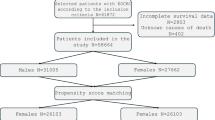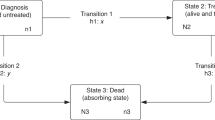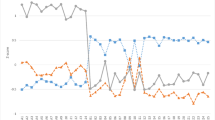Abstract
Male cancer patients’ use of a national cancer information service, their requests and key predictors of these over the period April 1996 to March 1998 are presented, in comparison with women. The most frequent requests of 411 prostate, 162 male and 217 female colorectal cancer patients were similar: site-specific information, emotional support, publications, specific therapies. Research or clinical trials (P< 0.05), diet and nutrition (P< 0.001) requests differed between men with prostate and colorectal cancers; complementary therapies (P< 0.05), prognosis (P< 0.05) requests differed between male and female colorectal cancer patients. Among prostate cancer patients, employed men aged 60+ were more likely to need emotional support than retired men aged 70 +; men < 59 years old were more likely to request publications, but less likely to enquire about specific therapies than others. Among male colorectal cancer patients, employed men were less likely to request site-specific information, but more likely to need emotional support than retired men; patients from geographical areas other than Thames were more likely to request publications; patients from manual classes were less likely to enquire about specific therapies than those from non-manual classes. The complexity of information and support seeking behaviour is demonstrated; no pattern was found among men or in comparison with women. Further research is needed to enable development of services that are appropriate to individual needs and concerns. © 2001 Cancer Research Campaign www.bjcancer.com
Similar content being viewed by others
Article PDF
Change history
16 November 2011
This paper was modified 12 months after initial publication to switch to Creative Commons licence terms, as noted at publication
References
Akechi, T, Okamura, H, Yamawaki, S & Uchitomi, Y (1998). Predictors of patients’ mental adjustment to cancer: patient characteristics and social support. BJC, 77, 2381–2385.
Altman, DG (1997). Relation between several variables. Practical statistics for medical research, Altman DG (ed) 325–364, Chapman and Hall: London
Altman, DG, Gore, SM, Gardner, MJ & Pocock, SJ (2000). Statistical guidelines and checklists. Statistics with confidence, Altman DG, Machin D, Bryant TN, Gardner MJ (eds) 171–201, BMJ Books: Bristol
Audit Commission (1993). What Seems to be the Matter: Communication between Hospitals and Patients. HMSO: London
Boudioni, M, McPherson, K, Mossman, J, Boulton, M, Jones, AL, King, J, Wilson, E & Slevin, ML (1999a). An analysis of first-time enquirers to the CancerBACUP information service: variations with cancer site, demographic status and geographical location. BJC, 79, 138–145.
Boudioni, M, Mossman, J, Jones, A, Boulton, M, Leydon, G, McPherson, K & Wilson, E (1999b). Do enquirers to CancerBACUP Information Service have support at home? Poster presentation, Cancer Research Campaign Grantees Meeting: London
Department of Health (1992). On the State of the Public Health: the annual report of the Chief Medical Officer of the Department of Health for the year 1992. HMSO: London
Department of Health (1997). The new NHS, Modern-Dependable, DoH: London
Department of Health (1998). A first class service-Quality in the new NHS, DoH: London
Department of Health (1999). No place in the NHS for inequalities of care, NICE Press Release: London
Department of Health (2000a). The NHS Cancer Plan. A Plan for Investement. A Plan for reform, DoH: London
Department of Health (2000b). £ 1M cash boost for prostate cancer research, DoH Press: London
Emslie, C, Hunt, K & Macintyre, S (1999). Problematizing gender, work and health: the relationship between gender, occupational grade, working conditions and minor morbidity in full-time bank employees. Soc Sci Med, 48, 33–48.
Expert Advisory Group on cancer to the chief medical officers of England and Wales. (1995). A policy framework for commissioning cancer services. Guidance for purchasers and providers of cancer services, DoH: London
Fallowfield, L, Ford, S & Lewis, S (1995). No news is not good news: information preferences of patients with cancer. Psycho-Oncology, 4, 197–202.
Fuhrer, R, Stansfeld, SA, Chemali, J & Shipley, MJ (1999). Gender, social relations and mental health: prospective findings from an occupational cohort. Soc Sci Med, 48, 77–87.
Garson, GD (2000). Logistic Regression. PA 765 Statnotes: An Online Textbook: A guide to writing empirical papers, theses and dissertations, Garson GD (ed)
Green, CA & Pope, CR (1999). Gender, psychosocial factors and the use of medical services: a longitudinal analysis. Soc Sci Med, 48, 1363–1372.
Greenglass, ER (1992). A gender-role perspective of social support: implications for psychological functioning. Int J Psychol, 27, 601
Harris, K (1998). The informational needs of patients with cancer and their families. Cancer Practice, 6, 39–46.
Harrison, J, Maquire, P & Pitcearthy, C (1995). Confiding in crisis: gender differences in pattern of confiding among cancer patients. Soc Sci Med, 41, 1255–1260.
Hart, N (1997). Social inequalities in health. The Sociology of Health and Medicine, Hart N (ed) 50–77, Causeway Press: Lancashire
Health Education Authority (1996). Men’s attitudes to health checks and awareness of male-specific cancers, Health Education Authority: London
Hunt, K & Annandale, E (1999). Relocating gender and morbidity: examining men’s and women’s health in contemporary Western societies. Introduction to Special Issue on Gender and Health. Soc Sci Med, 48, 1–5.
Kirby, RS & Kirby, MG (1999). Men’s health: closing the gender gap. Men’s health, Kirby RS, Kirby MG, Farah RN (eds) 1–3, ISIS Medical Media: Oxford
Leydon, GM, Boulton, M, Moynihan, C, Jones, A, Mossman, J, Boudioni, M & McPherson, K (2000). Cancer patients’ information needs and information seeking behaviour: in depth interview study. BMJ, 320, 909–913.
Manfredi, C, Czaja, R, Price, J, Buis, M & Janiszewski, R (1993). Cancer patients’ search for information. Monographs. J NCI, 14, 93–104.
Men’s Health Forum (1997). Men’s Health Forum: 1997 Strategy & Report. Men’s Health Forum: London
MORI social research (1999). Men’s Health; Awareness of testicular and prostate cancer; Research study conducted for the Institute of Cancer Research’s Everyman Campaign, MORI: London
Moynihan, C (1996). Psychosocial assessments and counselling of the patient with testicular cancer. Testicular cancer: Investigation managementHorwich A (ed) 403–419, Chapman & Hall: London
Moynihan, C (1998). Theories in health care and research: Theories of masculinity. BMJ, 317, 1072–1075.
National Cancer Alliance (1996). “Patient-centred cancer services?” what patients say, National Cancer Alliance: Oxford
Northouse, LL, Mood, D, Templin, T, Mellon, S & George, T (2000). Couples’ patterns of adjustment to colon cancer. Soc Sci Med, 50, 271–284.
Office for National Statistics (2000). Cancer statistics registrations; Registrations of cancer diagnosed in 1994, England & Wales. Series MB1, no 27, The Stationery Office: London Office of Population, Censuses and Surveys (1990) 1971–1983 Longitudinal study: Socio-demographic differences in cancer survival, Kogevinas E (ed) HMSO: London
Seidler, V (1989). Identity. Rediscovering masculinity: Reason, Language and Sexuality, Seidler V (ed) 107–122, Routledge: New York
Seidler, V (1998). Men, bodies, illness and vulnerability. Abstracts for ESPO 10. Psycho-oncology, 7, 165
Slevin, ML, Terry, Y, Hallett, N, Jefferies, S, Launder, S & Plant, R (1988). BACUP-the first two years: evaluation of a national cancer information service. BMJ, 297, 669–672.
The Stationery Office (1998). Our healthier nation, a contract for health (A consultation paper), The Stationery Office: London
The Stationery Office (2000). The NHS Plan. A plan for investment. A plan for Van reform, The Stationery Office: London
Van Der, Mollen (1997).
Williams, ERL, Ramirez, AJ, Richards, MA, Young, T, Maher, EJ, Boudioni, M & Maquire, P (1999). Are men missing from cancer information and support services? Abstract of poster presentation, 16th Annual Conference of the British Psychosocial Oncology Society: London
Wynne, B (1992). Misunderstood misunderstanding: social identities and public uptake of science. Public Und Sci, 1, 281–304.
Author information
Authors and Affiliations
Rights and permissions
From twelve months after its original publication, this work is licensed under the Creative Commons Attribution-NonCommercial-Share Alike 3.0 Unported License. To view a copy of this license, visit http://creativecommons.org/licenses/by-nc-sa/3.0/
About this article
Cite this article
Boudioni, M., McPherson, K., Moynihan, C. et al. Do men with prostate or colorectal cancer seek different information and support from women with cancer?. Br J Cancer 85, 641–648 (2001). https://doi.org/10.1054/bjoc.2001.1945
Received:
Revised:
Accepted:
Published:
Issue date:
DOI: https://doi.org/10.1054/bjoc.2001.1945
Keywords
This article is cited by
-
Men with prostate cancer make positive dietary changes following diagnosis and treatment
Cancer Causes & Control (2013)
-
Decisions to use complementary and alternative medicine (CAM) by male cancer patients: information-seeking roles and types of evidence used
BMC Complementary and Alternative Medicine (2007)



